 Petzlover
Petzlover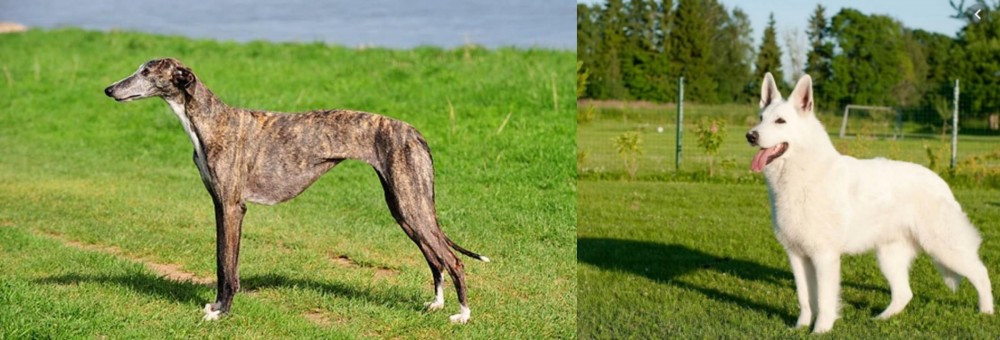 Galgo Espanol is originated from Spain but White Shepherd is originated from United States. Both Galgo Espanol and White Shepherd are having almost same height. Galgo Espanol may weigh 11 kg / 24 pounds lesser than White Shepherd. Both Galgo Espanol and White Shepherd has almost same life span. Both Galgo Espanol and White Shepherd has almost same litter size. Galgo Espanol requires Low Maintenance. But White Shepherd requires Moderate Maintenance
Galgo Espanol is originated from Spain but White Shepherd is originated from United States. Both Galgo Espanol and White Shepherd are having almost same height. Galgo Espanol may weigh 11 kg / 24 pounds lesser than White Shepherd. Both Galgo Espanol and White Shepherd has almost same life span. Both Galgo Espanol and White Shepherd has almost same litter size. Galgo Espanol requires Low Maintenance. But White Shepherd requires Moderate Maintenance
 Galgo Espanol means Spanish with galgo meaning greyhound, thus a Spanish Greyhound. This breed is ancient with their roots in perhaps the English greyhound and others in the sighthound family. They are much like the greyhound in that they are laid back, calm, gentle and quiet, unless they are competing on the local track. Like the greyhound they are shy and reserved; great with kids and other pets. And of course, they love cats.
Galgo Espanol means Spanish with galgo meaning greyhound, thus a Spanish Greyhound. This breed is ancient with their roots in perhaps the English greyhound and others in the sighthound family. They are much like the greyhound in that they are laid back, calm, gentle and quiet, unless they are competing on the local track. Like the greyhound they are shy and reserved; great with kids and other pets. And of course, they love cats.
There are dogs like the Galgo referred to in writing by the ancient Celts and Romans. One author, Arrian, had his own Galgos and used them when hunting. The breed flourished in the second half of the Middle Ages in Spain and well into the 8th century. When the Christians regained control of the Iberian Peninsula, they did away with the hunter old forms of hunting and introduced a new form with hounds that made the Galgo the pride of the aristocracy and not in the homes of the ordinary people. Arrian claim to two types of dogs, the smooth and rough coated.
Muslim and Chrisitan Kings kept Galgo Espanols. In all probability the Saluke and Galgo were crossbred at this time. It was illegal to kill a Galgo and in 1081, the Mayor of Cartuario of Slonza left his Galgo in his will to Diego Citid. Dogs seen in painting from the 12th century look just like dogs of this breed who can be seen today.
It is believed that when the Galgo was developed, it was in the midsection of Spain or the Castillian plains. They ruled the interior of the country while the bloodhound ruled the exterior. The 18th and 19th centuries saw very little change in the breed. However, in the 20th century, there was cross breeding with the English greyhound that produced a leaner, faster and powerful track racing dog. The results was a faster dog without the long distance stamina of the pure Galgo. For this reason, the breeders returned to breeding the pure professional racing dog.
The sport of racing the Galgo earns Spain around sixty million dollars per year. They train anywhere from three to four thousand of the Galgos every year for Open Field Coursing Championships. Still, there no longer is any cross breeding between the Greyhound and the Galgo. The current coursing programs feature a hare that is much hardier and difficult to pursue so the stamina of the old Galgo Espanol is desired. In Castile, where these games are played, the landscape is open with large fields that requires that the hare travels far greater distances. This means that the stamina of the original Galgo Espanol is needed.
When not racing the Galgos have become great house pets. They have a reputation as gentle dogs that are docile and quiet, with good health. This reputation is well earned. They are also successful show dogs in Europe much more than the states. This is perhaps because they are really rare outside of Spain. They are not recognized by the United Kennel Club nor the American Kennel Club.
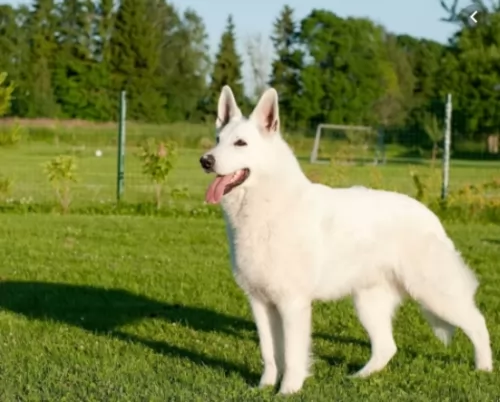 The German Shepherd and the white German Shepherd are the same dog - the only thing is that their coat colors vary.
The German Shepherd and the white German Shepherd are the same dog - the only thing is that their coat colors vary.
The White Shepherd evolved because people were looking for a working companion dog with a high degree of intelligence and a white coat.
The development of the White Shepherd began at the time of the 19th and 20th centuries. A breeding program was started but in 1933, the white coat color was made a disqualification in the German Shepherd Dog breed standard.
Not to be deterred, it was in 1969 that the U.S. and Canada formed White German Shepherd breed clubs and the breed was actually recognized by the UKC in 1999.
 Obviously the Galgos looks a lot like the Greyhound, but in some very important ways they are very different. The rear of the Galgos is higher than the front and their muscle are flatter. They are built for endurance while the Greyhound is built for speed. The Galgos is a lighter, smaller dog with larger ear on a long head. They have long tails and their chests are not deep like the Greyhounds.
Obviously the Galgos looks a lot like the Greyhound, but in some very important ways they are very different. The rear of the Galgos is higher than the front and their muscle are flatter. They are built for endurance while the Greyhound is built for speed. The Galgos is a lighter, smaller dog with larger ear on a long head. They have long tails and their chests are not deep like the Greyhounds.
The Galgo comes in smooth and rough coats and a variety of colors. The rough coat protects dogs that are in climates colder than the ones in Spain and also keeps them from injuring their skin while running. The colors include brindle, black, golden, toasted, cinnamon, yellow, red, white, white with patches, or any color as long as they have a white forehead and muzzle.
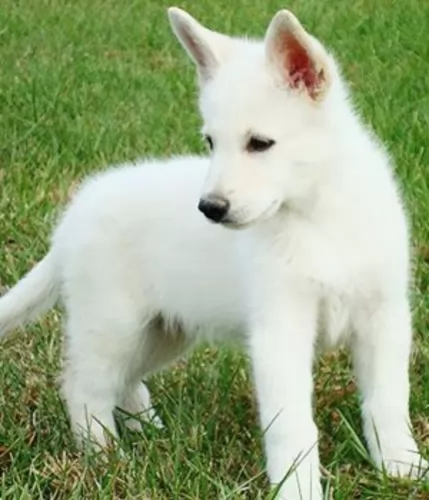 The White Shepherd is a true beauty and is a medium to large-sized dog that is muscular and strong. He stands at between 55 and 65cm in height and weighs between 35 and 40kg.
The White Shepherd is a true beauty and is a medium to large-sized dog that is muscular and strong. He stands at between 55 and 65cm in height and weighs between 35 and 40kg.
He is somewhat longer than tall. The double coat is medium length, dense, straight and white. He is a fairly heavy shedder. He has an intelligent face, a long muzzle and erect ears. The long tail is low-set.
This beautiful dog’s face tells you that he is highly intelligent. He can be easily trained. The bright eyes are eager and alert and he is ready to be an excellent guard dog and take his role as protector and guardian seriously.
The White Shepherd loves his human family and isn't overly enthusiastic around strangers. They’re playful dogs and will make great playmates for children. They also aren’t aggressive with other dogs and will get on well with other pets in the house.
 They are good with children, but you need to be careful no one gets knocked down or hurt.
They are good with children, but you need to be careful no one gets knocked down or hurt.
Stamina for running and a good record in lure coursing.
Though they can be couch potatoes like greyhounds they are better off with a fenced yard and not an apartment.
They are smart and can learn anything you want to teach them if you can keep their attention.
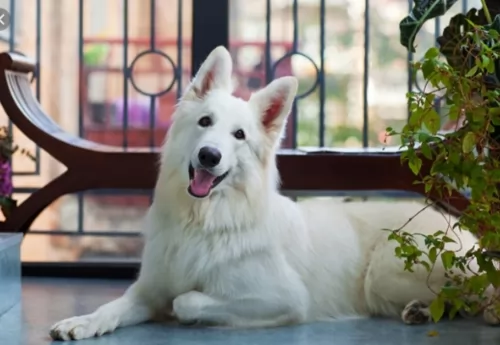 The White Shepherd is such a beautiful dog and he has some great characteristics to match his good looks.
The White Shepherd is such a beautiful dog and he has some great characteristics to match his good looks.
He is friendly and amicable with his human family and is a great protector as well. He isn’t aggressive yet he makes a great watchdog.
He is loving and loyal and forms strong bonds with his human family. Bringing him into your home and heart is guaranteed to confirm the opinion held that dogs are man's best friend.
 Being a large dog, the Galgo Espanol would normally face a high probability of hip dysplasia. Fortunately for the breed this is not true. In this respect their lightness of weight, their history as a working dog and their anatomy have protected them from it. They are however susceptible to other issues.
Being a large dog, the Galgo Espanol would normally face a high probability of hip dysplasia. Fortunately for the breed this is not true. In this respect their lightness of weight, their history as a working dog and their anatomy have protected them from it. They are however susceptible to other issues.
Malignant tumors that quickly spread throughout the body. Life threatening.
As a sighthound, the Galgo Espanol is prone to have issues anytime with anesthetics. They don’t metabolize the anesthetics like other dogs do. They will take longer to revive, and they are susceptible to hypothermia while under an aesthetic.
While running, they are prone to injuries
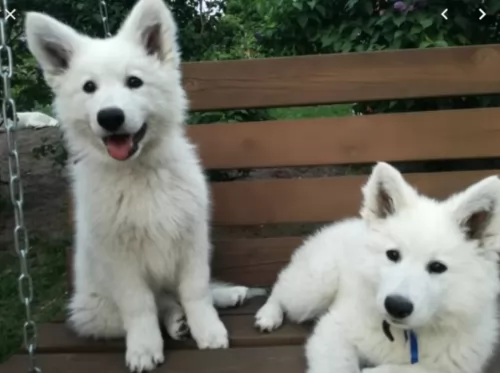 The White Shepherd shares health problems much the same as the German Shepherd, and one of these is hip dysplasia.
The White Shepherd shares health problems much the same as the German Shepherd, and one of these is hip dysplasia.
These dogs are at risk of getting hip dysplasia. It’s a congenital disorder with dogs inheriting the disease from their parents. Some young dogs can get the disease too. Because they are such active dogs, the White Shepherd is at risk of dysplasia. There are a number of signs you can look for in your dog and some of these are -
Your vet may want x-rays to examine your dog's hips. Your vet will want to slow the development of the disease and also ease the pain in your pet. There are other steps the vet will suggest to you that can make it as comfortable as possible for your pet.
 Feed your puppy a high quality dry food made for large breed dogs. Feed 3 meals a day 2.5 to 3 cups total for the day.
Feed your puppy a high quality dry food made for large breed dogs. Feed 3 meals a day 2.5 to 3 cups total for the day.
Feed your adult Galgo a high quality dry food made for large breed dogs. Feed 2 meals a day but don’t overfeed Give 4-5 cups total for the day.
They have amazing stamina and good speed. Generally good health as a breed.
He can be a couch potato indoors and runs forever outdoors. He does need daily exercise and bedrest both. The best would be if you could sprint him every day or have a small yard he can play in. They excel of course at agility and lure coursing. Keep them on a leash because if they run you will never catch them. The American Sighthound Field Association presents lure coursing events that they are eligible for. They have exceled at show competition in Europe but are not well known in the U.S.
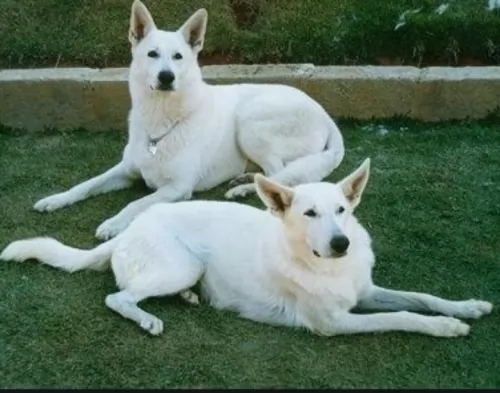 The White Shepherd's weather-resistant double coat will need to be brushed regularly as he is quite a heavy shedder. When brushing him, check for ticks and fleas as well as any unusual lumps.
The White Shepherd's weather-resistant double coat will need to be brushed regularly as he is quite a heavy shedder. When brushing him, check for ticks and fleas as well as any unusual lumps.
This beautiful dog was developed from a herding breed so he is very active. He will love a walk every day but that won’t be sufficient. He just loves ball games, and if you take him to the park, he’ll love you throwing sticks for him or the frisbee.
Because of his intelligence, he will require mental and physical stimulation. You get some toys for dogs where you can put some kibble in the toy and he has to figure out a way to get the food out.
The White Shepherd is an active dog, so to keep him that way, ensure he gets good food which has the right balance of vitamins.
There are good commercially manufactured dog foods on the market, but the idea is to know how to choose the high-quality ones and to avoid the ones that can actually jeopardize your dog’s health.
Always read the write-up on the packaging and choose according to your pet’s age and his activity levels.
It is always a good idea to give such a dog some home-made food too. Not any kind of home-made food either because you have to be careful with dogs to avoid them suffering from abdominal pain. They like their food plain and simple – boiled chicken, brown rice and vegetables.
Some raw meat occasionally is also good. Don’t forget to ensure a constant supply of cool, fresh water.